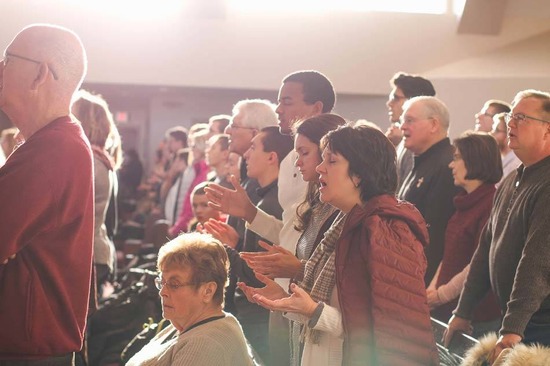While you certainly don’t have to go to church to develop a relationship with Jesus, the Bible makes it clear that gathering together with other believers can be really beneficial for your spiritual growth.
For the early Christian church we read about in the New Testament, “going to church” wasn’t just about getting together once a week.
Rather, church and worship was about creating a habit that revealed to the outside world what the early church valued: community and the risen Jesus.
We can use the early church as an example to see why church, or gathering together for worship and study, was important in the Bible as well as why attending church might be useful for your own spiritual journey.
Specifically, we’ll look at these questions:
- What does the Bible say about attending church?
- Do I have to go to church to be a Christian?
- Why might someone choose to go to church?
So let’s dive into the Word of God and learn what the Bible says about the practice we know of today as attending church.
What does the Bible say about attending church?

Photo by Ismael Paramo on Unsplash
In the Bible, “church” was a bit different than what we picture today. In fact, other than a few references to temples and synagogues, there isn’t really any mention of going to church, but there is a lot of mention of being the church.
When the word “church” is used in the Bible, it’s referring to people, not a place or a building. Uses of “the church” or “churches” referred to the collective community of believers (Matthew 18:17; Acts 9:31; Acts 12:5; Acts 14:27, etc.) or a specific group of believers in an area (1 Corinthians 1:2).
So what is being the church all about? Well, church in the Bible was far less about having a specific building to go to, and far more about fostering community and living out the gospel, whether that meant worshiping with fellow believers or sharing the gospel with people who haven’t heard it before.
That being said, there’s a lot in the Bible that references the importance of gathering together as a community. And often we can determine that people would meet together in their homes (Romans 16:5).
In fact, much of the New Testament is dedicated to documenting the creation of the early church and the letters that went to those new communities of believers.
In one of those letters, Paul tells the church:
“Let us hold fast the confession of our hope without wavering, for He who promised is faithful. And let us consider how to stir up one another to love and good works, not neglecting to meet together, as is the habit of some, but encouraging one another, and all the more as you see the Day drawing near” (Hebrews 10:23-25, ESV).
In other words, don’t forget about the promise and hope of the gospel. In order to prepare for the second coming of Jesus Christ, we should meet together regularly. That way, we can inspire and support one another to live a life of love and doing good.
God’s word also guides us to recognize each other’s strengths, spiritual gifts, and roles that we can play as members of the body of Christ, also known as the church:
“For as in one body we have many members, and the members do not all have the same function, so we, though many, are one body in Christ, and individually members one of another” (Romans 12:4-5, ESV).
Each one of God’s people has a gift, and together, the church can’t exist without its members, just as a body can’t function without arms, legs, eyes, organs, etc. Together, the church makes up the whole body of Christ.
If anything, the Bible does emphasize that when it comes to believing in Christ and keeping your faith strong, there is significant power and positivity in gathering together with other believers.
When believers are isolated or separated from each other, it becomes more difficult to use our gifts to share the message of the gospel. We also miss out on a spiritual support community.
While you can certainly share the gospel of Jesus on your own, the church is meant to be a collective rather than individual institution.
We can learn more about what the Bible says about attending church by looking at the model for the early church in the book of Acts.

Photo by Gregory Atkats on Unsplash
What was church like in the Bible?
Before the apostles started spreading the gospel, “church” attendance in the Bible had more to do with Jewish tradition.
In the Old Testament, holy days, feasts, and gatherings were held in order to remember important events in Jewish history, such as Passover, which commemorates God leading the children of Israel out of Egypt.
These were times of remembrance as well as times of praise and worship to God for all He’d done for them.
In the New Testament, we also read about Jews attending synagogues to be taught by religious leaders.
In fact, Jesus regularly taught in synagogues (Luke 4:16-37; John 6:22-59), as did the apostle Paul (Acts 17:2; Acts 19:8).
Interestingly, synagogue refers both to the gathering of Jewish people as well as to the building in which they met. Synagogues were also places of political gatherings, courts of law, and community centers.1
But after Jesus’ resurrection, the apostles began to spread the gospel and cultivate churches in various locations. These “churches” weren’t really buildings like synagogues, but they refer more to the early groups of Christians and Jewish Christians and how they treated each other and others.
In the book of Acts, Luke describes the early church and the actions of the early Christians:
“And they devoted themselves to the apostles’ teaching and the fellowship, to the breaking of bread and the prayers” (Acts 2:42, ESV).
Based on this verse (and the verses that follow it), we can see that for the early Christians, church was about:
- Devoting themselves to the teaching of the apostles about God and Jesus Christ
- Spending time in fellowship with other believers and sharing things with each other as they had need (Acts 2:44-45)
- Sharing meals together
- Praising God through prayer and gratitude
These practices helped strengthen early believers in the gospel, giving them the support, structure, and encouragement they needed to spread the gospel to even more people.
So we can see how the early Christian church has modeled to us that our church, or our faith community, matters.
But is church essential to be a believing Christian? Is it important for salvation?
Let’s find out.
Do I have to go to church to be a Christian?

Photo by Jeremy Perkins on Unsplash
No! You don’t have to go to church to be a Christian, and you certainly don’t have to go to church to have a close relationship with Jesus.
In fact, some of the greatest figures of the Bible who were known for their closeness to God didn’t go to church. People like Enoch, Moses, David, and John the Baptist.
But it’s important to remember that these people didn’t necessarily have “church” the way that we know it.
People like Moses, David, and John the Baptist had Jewish traditions, teachings, holy days, and community to create religious and spiritual accountability.
It’s also important to consider how different life was in the ancient world. People simply didn’t have as many things to distract them from spirituality.
Even the people who didn’t worship God worshiped other gods—taking time for spiritual ceremonies, practices, and holy days was a common and important part of life.
So in one way or another, there was some sort of spiritual accountability, even when “going to church” as we know it today didn’t yet exist.
Church attendance isn’t a box to be “checked off” for being a Christian or even for having salvation. In fact, some of the church officials of Jesus’ time, the Pharisees and Sadducees, denied Jesus as Savior and persecuted Him.
That being said, there are reasons churches exist. And there are reasons Jesus encouraged His followers to regularly gather together to support one another and study together.
There are many, many ways church can be so beneficial for us. So let’s explore some of those reasons.
Why might someone choose to go to church?
Christians and Seventh-day Adventists choose regular church attendance for a variety of reasons, including:
- Fellowship and community building
- Spiritual encouragement and support
- New ideas and concepts through Bible study
- Worshipful experiences
- Supporting their local community
- Supporting their global community
Fellowship and community building

Photo by adrianna geo on Unsplash
Fellowship is an important concept in the Bible. After all, God created us as social and relational beings!
Gathering together is all about how we love one another, building genuine and generous relationships, just as Jesus did when He was on this earth.
Having a set time and place, like church, for fellowshipping and cultivating this community makes it easier to create and maintain. For Adventists, the Sabbath day is an ideal time to do this.
When we take the time to get to know fellow believers, build trust in each other, and learn to love each other selflessly, we get a great picture of what Heaven is going to be like!
Spiritual encouragement and support
There is a lot in this world to distract us: work, social media, shopping, hobbies, social obligations, and all the tedium of life in general! There are so many things we have to focus on just to keep our heads above water and our households running.
These things, while definitely not bad by themselves, can accidentally take higher priority than our spirituality and relationship with Jesus.
Going to church is a great way to hit “reset” on our priorities. It can remind us that Jesus should be our number one priority, and serving others should come second to that.
Church can also be a great source of spiritual support. Whenever someone is going through hardship or is feeling doubtful, anxious, or angry about something, their church family can be a source of support and encouragement.
The fact is, we need each other. And church helps us make that happen, all under the umbrella of Christ’s love.
New ideas and concepts through Bible study
Our faith community also helps us grow in different ways than if we were going about everything alone.
Ever read through a couple of Bible verses and wished you could discuss it with a group? Or were you ever watching TV, and something in the plot reminded you of a spiritual concept you want to explore further in the Bible?
Well, in church, you have the opportunity to do that!
Many local churches have 60- to 90-minute Bible study sessions before the main church service. Church members, friends, and visitors can get together for more of a small-group style gathering before everyone heads into the sanctuary to worship all together. The Adventist Church calls this time “Sabbath School.”
Some Sabbath School groups follow topics they determine beforehand, others follow a lesson or study guide, and others might go by which questions or topics the group brings up for that week.
Not only is this a great way to gain insight into the Word of God, but it’s also a great way to have spiritual accountability, support, and encouragement on a more personal level.
When we study the Bible together, we can bounce ideas and interpretations off of each other and remain faithful to our commitment to God.
And this insight into the Word of God doesn’t stop at the small groups.
Listening to the sermon during the main worship service can also provide us with new spiritual ideas and concepts. Food for thought that we can “chew on” as we go into the next week.
So while church isn’t a “requirement” for being saved, or even for cultivating a relationship with Jesus, it’s there as an invaluable resource for us. God doesn’t make us take this journey alone! He can guide each of us to a faith community.
Worshipful experiences—with a group!

Photo by Seth Gerak on Unsplash
In church, we get to listen to Scripture, experience baptism, pray together, and sing praise songs to God.
While you can do many of these things alone, there is something so special about kneeling before God or singing to Him alongside several fellow believers.
And, being a part of voices praising God can be astoundingly beautiful. It can open up your heart to the voice of the Holy Spirit in new ways you might not expect.
Supporting the local community
If going to church was only about sitting in a building with people once a week, then it wouldn’t really be church!
Church is also meant to extend outside of the church walls. When we have a grouping of believers, we can better organize community events to share the freedom of the gospel with others.
A church can also have good access to resources, including food, money, and shelter, that can be used to support those who fall on hard times.
Meeting the needs of the community is important, and having an established church can make it easier to participate in outreach.
Supporting the global community
When we’re a part of a church, especially one with global reach, we also plug ourselves into a worldwide movement. We can be a part of a mission so much bigger than ourselves.
Being a part of a church community is like having family members all around the world. We can learn about and celebrate the diversity of our global family, and also know that we are united in the same mission of sharing the gospel and living out the love of Jesus.
Additionally, organized mission projects share the love of Jesus while also contributing to the infrastructure and health of a given community. These types of projects are usually only possible because of the organization and resources of a church.
So… should I go to church?
If you are on a spiritual journey and would love to find some companionship along the way, a church community could be just the resource you need. Who knows…finding a local church might be one of the best things you do.
There is so much to be gained from sharing in worship with others.
And by following the early church’s example of creating community, sharing food with each other, spreading the gospel, studying the Word, and worshiping together, we can add fulfillment to our lives and broaden our perspectives.
Find a Church
If you’re interested in finding a local Adventist church near you, you can use the Adventist Locator provided by the General Conference of Seventh-day Adventists.
Then it might be helpful to head over to our page that explains what you can expect from attending an Adventist Church. No doubt, there is an Adventist congregation that would love to welcome you.
- The Bible and Interpretation: Jesus and Early Synagogues [↵]
More Answers
What Jesus’ Example Can Teach Us About Prayer and Fasting
Fasting and prayer were a big part of Jesus’ ministry on Earth. Let’s learn how Jesus’ example can teach us how to have a deeper relationship with God.
Relationships
The relationships of our lives can range from blissful to rocky, easy to difficult, fun to boring…
Prayer
Prayer is a simple act of faith with powerful life-changing effects. It’s talking to God and opening your heart to Him, just like you would open your heart to a friend.
How the Bible Defines Love
Everyone talks about it, but do we really know what it means?
What Is Peter’s Ladder of Virtues, and How Does It Work?
Peter’s ladder of virtues is a phrase that refers to eight characteristics to be developed as a person grows in their relationship with Jesus Christ. It can be found in 2 Peter 1.
What the Bible Says About Resolving Conflicts
While it’s the main ingredient in a good story, it unfortunately can spoil things in real life. It might start from minor differences of opinion. But unchecked, it can turn into what feels like a full-blown war.
What Are the Beatitudes (And What Do They Mean)?
What Are the Beatitudes (And What Do They Mean)?The Beatitudes, found at the beginning of Jesus’ Sermon on the Mount in the Gospel of Matthew, are Jesus’ kingdom manifesto. They describe the way His kingdom works and what it means to be one of His followers. Even...
What Is the Fruit of the Holy Spirit in the Bible?
When we cultivate our relationship with Jesus, the Holy Spirit gives us traits that help us in our day-to-day activities and interactions. These are the fruit of the Spirit.
Does Prayer Work? If So, How Are Prayers Answered?
Prayer is how human beings reach out to a higher power. For Christians, it’s how we communicate with God. But does it really work? Is it true that God actually intervenes in situations when we call out to Him for help? And why are some prayers answered immediately, while others seem to go unanswered or not get answered for a long time?
Prayer—How Do I Do It?
Prayer is intentional communication with God. And the way you go about it is much like how you’d communicate with your best friend. You can reach out anytime and anywhere, in the way that’s most natural between the two of you.
15 Examples of Prayer in the Bible
Prayer is the primary way we maintain our relationship with God. It’s our method of communication, and He miraculously hears every word that comes from our hearts.
The Armor of God as Described in Ephesians
In Ephesians 6, the Apostle Paul was helping people understand what it means to defend themselves within a spiritual war (Ephesians 6:10-18).
Didn’t find your answer? Ask us!
We understand your concern of having questions but not knowing who to ask—we’ve felt it ourselves. When you’re ready to learn more about Adventists, send us a question! We know a thing or two about Adventists.












